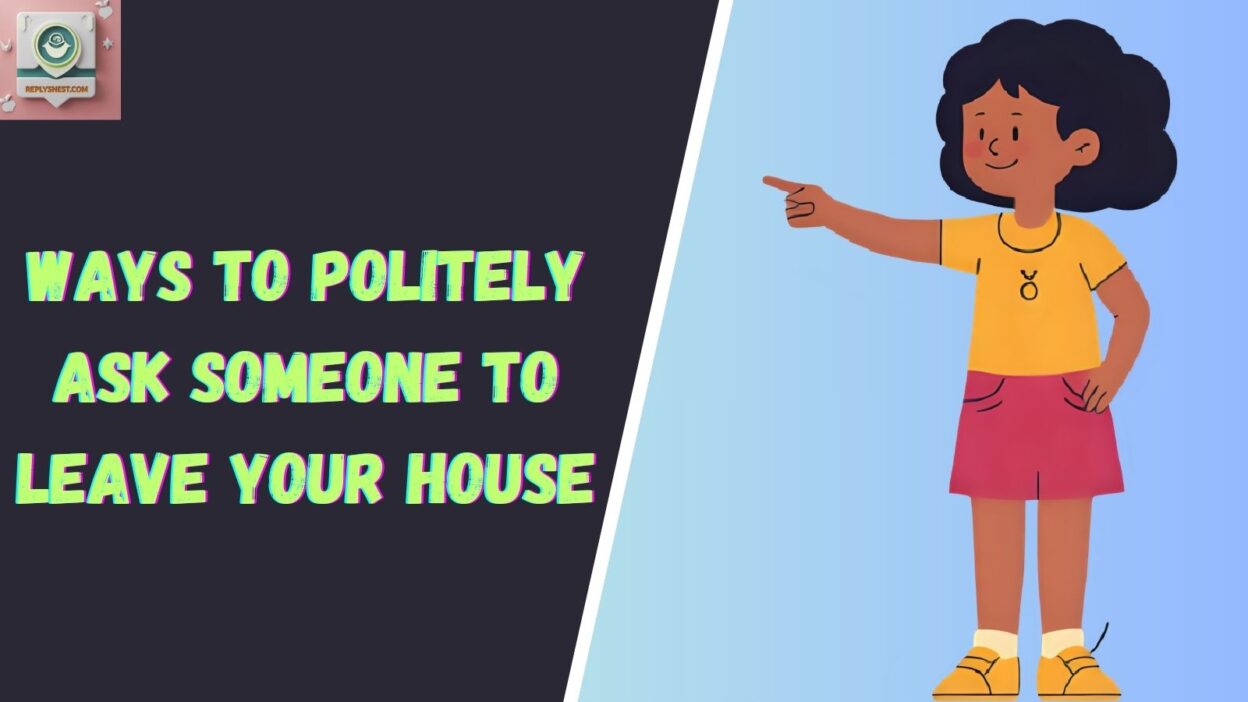Having guests over is wonderful until it isn’t. We’ve all been there: you’ve had a great evening, laughter filled the room, snacks were devoured, stories were exchanged… and now it’s getting late. Maybe you’re tired, maybe you’ve got work in the morning, or maybe you just need your personal space back. Asking someone to leave your house can feel awkward, but with the right words, you can do it politely, warmly, and without hurting anyone’s feelings. Ways To Politely Ask Someone To Leave Your House.
When people come over to your home, it can be a great experience, but certain circumstances like a late evening or a busy morning—may require you to bring the visit to a close. I’ve learned that the best way is to gracefully communicate with tact and kindness. Instead of showing discomfort, you can politely express the need for their departure while keeping the company feeling appreciated.
A warm smile, a gentle tone, or even expressing genuine appreciation for their presence by saying “thank you for coming” helps the transition feel natural. When I once had friends heading out after a late-night get-together, I simply mentioned my tasks the next day and how I needed to wrap up, which they understood without feeling unwanted.
Sometimes, life’s commitments and responsibilities make it impossible to extend a conversation. If you need to attend personal matters, prepare for work, or an early meeting, it’s okay to mention your agenda or commitments directly. Using understanding, empathy, and a legitimate reason like needing to finish something important or ensuring proper rest for your well-being makes the message clear.
I’ve found that sharing a plan to catch up again soon or suggesting a future hangout keeps the connection intact. Whether it’s a night when you hate to cut things short, or a morning where you need to get up early, you can still continue with hope that the conversation will resume in the near future, leaving everyone feeling good about the time spent together.
1. “It’s Getting Late, I Should Probably Wind Down Now.”
- Best Use: When you’ve hosted a casual evening and want to signal bedtime.
- Not to Use: If it’s still early evening and your guests are expecting more time together.
- Other Ways to Say: “I think I need to call it a night.”
- Example: “I’ve loved having you here tonight—it’s getting late though, so I should probably wind down.”
Read More: Other Ways To Say ‘What Time Suits You Best?’
2. “I Have an Early Morning Tomorrow.”
- Best Use: When you genuinely have plans the next day.
- Not to Use: If you’re staying up watching Netflix after they leave (they might notice).
- Other Ways to Say: “I’ve got a busy day ahead.”
- Example: “This was so much fun! I’ve got an early morning tomorrow though, so I’ll need to wrap things up.”
3. “I Need to Get Some Rest.”
- Best Use: When you want to emphasize health and well-being.
- Not to Use: If your guests came over for emotional support—they might feel brushed off.
- Other Ways to Say: “I think it’s time for me to get some sleep.”
- Example: “I’m really glad you came over. I need to get some rest now, but let’s catch up again soon.”
4. “This Has Been Lovely, Let’s Plan Another Get-Together Soon.”
- Best Use: To end things on a warm and inviting note.
- Not to Use: If you don’t actually want to plan another get-together.
- Other Ways to Say: “Let’s do this again sometime.”
- Example: “It’s been such a lovely evening. Let’s plan another get-together soon!”
5. “I Don’t Want to Keep You Too Late.”
- Best Use: When you want to frame the departure as being considerate of their time.
- Not to Use: If they’re clearly eager to stay longer.
- Other Ways to Say: “I know it’s getting late for you too.”
- Example: “I don’t want to keep you too late—you probably need some rest as well.”
6. “I’ve Got a Few Things I Need to Finish Up Tonight.”
- Best Use: If you need to reclaim your evening for chores or work.
- Not to Use: If you have nothing to actually finish, and they might find out.
- Other Ways to Say: “I need to get back to a couple of things.”
- Example: “I’ve got a few things I need to finish up tonight, so I’ll let you head out.”
7. “Thank You So Much for Coming, I Really Enjoyed This.”
- Best Use: Ending on gratitude is always graceful.
- Not to Use: If you’re visibly rushing them out (it can sound insincere).
- Other Ways to Say: “Thanks for making the time to come over.”
- Example: “Thank you so much for coming, I really enjoyed this.”
8. “I Think We Should Wrap Up for Tonight.”
- Best Use: Works well for group gatherings or game nights.
- Not to Use: If you’re with someone who struggles with directness—they may take it harshly.
- Other Ways to Say: “Let’s call it a night.”
- Example: “This was so much fun! I think we should wrap up for tonight.”
9. “I Don’t Want to Keep You From Your Evening.”
- Best Use: Polite way to suggest they may have things to do too.
- Not to Use: If they’ve said repeatedly they’re free.
- Other Ways to Say: “I don’t want to take up your whole night.”
- Example: “It’s been great chatting. I don’t want to keep you from your evening though.”
10. “I Need Some Quiet Time to Recharge.”
- Best Use: Works for introverts who need alone time.
- Not to Use: With guests who may not understand or take it personally.
- Other Ways to Say: “I need a little downtime now.”
- Example: “This has been great—I need some quiet time to recharge now.”
11. “Let’s Save the Rest of Our Stories for Next Time.”
- Best Use: When conversations are flowing but you need to pause them.
- Not to Use: If there’s no realistic ‘next time.’
- Other Ways to Say: “We’ll pick this up another day.”
- Example: “I’m loving this, but let’s save the rest of our stories for next time.”
12. “I Should Probably Start Getting Ready for Bed.”
- Best Use: When you want to casually hint it’s bedtime.
- Not to Use: Midday or afternoon visits.
- Other Ways to Say: “I think it’s about that time.”
- Example: “This was wonderful. I should probably start getting ready for bed now.”
13. “I Need to Get Things Ready for Tomorrow.”
- Best Use: If you’ve got errands, kids, or work in the morning.
- Not to Use: If tomorrow is wide open and they know it.
- Other Ways to Say: “I’ve got some things to prep for tomorrow.”
- Example: “I need to get things ready for tomorrow, so I should let you head out.”
14. “This Was Great, Let’s Do It Again Soon.”
- Best Use: Casual phrasing for friends or close acquaintances.
- Not to Use: If you don’t mean it.
- Other Ways to Say: “We should hang out again.”
- Example: “This was great, let’s do it again soon.”
15. “I Think It’s Time to Call It a Night.”
- Best Use: A classic, no-fuss way to wrap things up.
- Not to Use: Mid-afternoon or too early in the evening.
- Other Ways to Say: “Let’s end it here for tonight.”
- Example: “It’s been such fun, but I think it’s time to call it a night.”
16. “I Don’t Want to Overtire Myself.”
- Best Use: A gentle way of saying you need rest.
- Not to Use: With very energetic guests who won’t get the hint.
- Other Ways to Say: “I need to pace myself.”
- Example: “I don’t want to overtire myself, so I’ll need to wind down now.”
17. “I’ve Got a Couple of Things I Still Need to Do Before Bed.”
- Best Use: Casual way to excuse yourself for chores or prep.
- Not to Use: If you’ve already said you were going to bed.
- Other Ways to Say: “I should take care of a few things.”
- Example: “This was really fun. I’ve got a couple of things I still need to do before bed.”
18. “I Don’t Want to Hold You Up Any Longer.”
- Best Use: Polite and thoughtful.
- Not to Use: With close friends who clearly don’t mind.
- Other Ways to Say: “I’m sure you’ve got things to do too.”
- Example: “This was such a great evening. I don’t want to hold you up any longer.”
19. “It Looks Like It’s Getting Late.”
- Best Use: Lighthearted, observational way of signaling time.
- Not to Use: In broad daylight.
- Other Ways to Say: “The night’s flown by.”
- Example: “Wow, it looks like it’s getting late! Time really flew.”
20. “Let’s End On a Good Note.”
- Best Use: When you want to finish with positivity.
- Not to Use: If the night’s been awkward—it may sound forced.
- Other Ways to Say: “Let’s wrap this up on a high point.”
- Example: “This has been a great time—let’s end on a good note.”
21. “I’ll Walk You Out.”
- Best Use: A non-verbal, warm way of signaling it’s time.
- Not to Use: If you don’t actually plan to show them the door.
- Other Ways to Say: “Let me show you out.”
- Example: “Thanks again for coming! I’ll walk you out.”
22. “Let’s Continue This Conversation Another Day.”
- Best Use: When you want to keep the connection alive.
- Not to Use: If you don’t actually plan to follow up.
- Other Ways to Say: “We’ll pick this up soon.”
- Example: “This has been wonderful. Let’s continue this conversation another day.”
23. “I Think I’ve Reached My Limit for Today.”
- Best Use: Honest way of expressing social fatigue.
- Not to Use: If the guest is sensitive and may misinterpret it.
- Other Ways to Say: “I’m at my social limit.”
- Example: “I think I’ve reached my limit for today—I’ll need to say goodnight.”
24. “I Need Some Time to Unwind Alone.”
- Best Use: For close friends who understand your boundaries.
- Not to Use: With new acquaintances—it might sound too blunt.
- Other Ways to Say: “I need a little downtime.”
- Example: “I need some time to unwind alone, but I loved catching up with you.”
25. “It’s Been Wonderful, But I Should Let You Get Going.”
- Best Use: Gentle balance of gratitude and closure.
- Not to Use: If you don’t actually feel it was wonderful (keep it authentic).
- Other Ways to Say: “I should probably let you head out.”
- Example: “It’s been wonderful, but I should let you get going.”
Conclusion
Asking someone to leave your house doesn’t need to be awkward or harsh. With the right phrasing, you can set boundaries while still showing care and warmth. The key is to be genuine, kind, and considerate of both your needs and theirs. From subtle hints to more direct statements, these 30 polite ways give you flexibility depending on the situation.
I’ve personally found that a balance of gratitude + honesty works best—thank them for their time, then gently signal that it’s time to end. This way, everyone leaves with good feelings intact.
Editor’s Picks: Top 10 Polite Ways (and Why People Love Them)
- “I have an early morning tomorrow.” – Relatable and practical.
- “This has been lovely, let’s plan another get-together soon.” – Leaves things on a positive note.
- “I’ll walk you out.” – Subtle, non-verbal, and warm.
- “I don’t want to keep you too late.” – Shows consideration for the guest’s time.
- “It’s getting late, I should probably wind down.” – Classic and gentle.
- “Thank you so much for coming, I really enjoyed this.” – Gratitude softens the exit.
- “I think it’s time to call it a night.” – Clear without being rude.
- “Let’s save the rest of our stories for next time.” – Promises a future connection.
- “I need to get some rest.” – Simple, honest, and universally understood.
- “It’s been wonderful, but I should let you get going.” – Balanced and kind closure.



